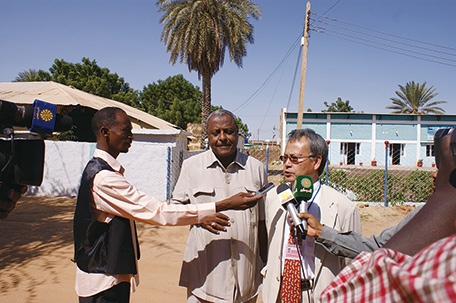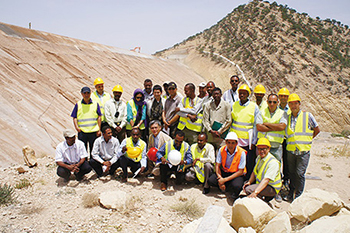Stories from the field 06
Using Morocco’s Experience to Inspire Hopes and Dreams:
– Human Resources Development in the Water Supply Sector in Sudan, Africa

Mr. Uemura is interviewed by Sudanese media. (Photo: Mitsuro Uemura)
Sudan fell into a state of civil war after gaining independence in 1956. Japan suspended provision of ODA to Sudan in principle, with the exception of emergency and humanitarian assistance, in 1992 because of the serious human rights violations occurring in the country. After the signing of the Comprehensive Peace Agreement1 in 2005, however, Japan revised its policy on the provision of assistance.
The years of conflict in Sudan resulted in a large number of internally displaced persons, wide-spread poverty, and lack of basic living infrastructure. Japan, which defines the promotion of human security as one of the basic policies of development cooperation, resumed provision of assistance to Sudan for consolidation of peace, and recovery and reconstruction, in line with the Official Development Assistance Charter at the time, while closely monitoring the progress of the democratization process, rule of law, and respect of basic human rights in the country. This policy is maintained under the new Development Cooperation Charter as well, and Japan has been providing assistance for social infrastructure development for the people of Sudan while making sure to take the situation in the country fully into account.
Supporting social infrastructure development is indispensable for peace consolidation, as well as recovery and reconstruction. Development of infrastructure for the stable provision of safe water, in particular, is an issue of vital importance. The rate of access to safe water reached 65% in the 1990s, but the conflict brought this figure down to 57%. The situation deteriorated to the point where in some areas even unsanitary water containing suspended solids was scarce.
It therefore became necessary to develop human resources who could not only build new water supply facilities, but also maintain and manage them. A large number of wells and water supply facilities that had been built in the past with assistance from other countries have no longer functioned for the supply of safe water due to inadequate maintenance and management. In response to a request from the Government of Sudan, the Government of Japan launched the Project for Human Resources Development for Water Supply in June 2008. Expert Mitsuro Uemura serves as the Project Leader.
“The Nile, which is the world’s longest river, flows through Sudan. The country also has access to the Nubian Sandstone Aquifer System (NSAS), which holds abundant reserves of groundwater. However, there are areas in which people have no choice but to rely on rainwater storage reservoirs and inefficient hand pumps. Technologies for the maintenance and management of the various water facilities are necessary in order to realize access to safe water. It is also necessary to improve water policies, including the system for collection of water charges. Development of human resources who can take responsibility for such water policies is indispensable for Sudan,” says Mr. Uemura.
Mr. Uemura is an expert in the field of water supply with extensive experience, providing technical guidance at the sites of development cooperation in developing countries in Africa, the Middle East and Asia since the 1980s.
The project was launched in 2008, and in the first three years, Japanese experts provided thorough guidance to managers and engineers holding core positions at water corporations in each state to provide the knowledge and technical capabilities needed to realize high-level water policies. Mr. Uemura also encouraged proactive interaction and information exchanges among engineers across state borders, through training programs.

At the construction site of a water reservoir dam. (Photo: Mitsuro Uemura)
The project focused on provision of training for engineers working at the sites. Mr. Uemura, taking advantage of his extensive experience in international cooperation in the field of water supply, implemented training through “triangular cooperation”2 in Morocco, where he had served as an expert on two previous occasions.
Mr. Uemura visited Morocco for the first time in 1985. Later, Morocco engaged in water sector policy reforms as part of its National Development Plan. As a result, the water coverage in rural areas improved from 14% before the start of reforms to 95% as of present. Sudan and Morocco share several features in common. Both are African countries with desert areas and limited water resources. Using as an example Morocco, which successfully implemented water sector policy reforms, despite facing similar difficulties to Sudan, Mr. Uemura tried to inspire hope in his Sudanese counterparts.
According to Mr. Uemura, Sudanese engineers, who initially were convinced that nothing would change no matter what they do, underwent a noticeable change in attitude after participating in the training in Morocco. He says, “The Sudanese engineers realized how far behind their water policies had fallen in comparison with Morocco. This gave them hope and they felt that if a fellow African nation could make such improvements, so could Sudan. To inspire change for the better in the face of difficulties, we have to set goals that are actually conceivable.” Mr. Uemura highlights the vital importance for Sudan to “outgrow” its reliance on foreign assistance and establish independent water policies. “Our role is similar to that of an acupuncturist. An acupuncturist inserts fine needles into stiff, painful areas of the body and improves blood circulation. However, ultimately, patients cannot restore their health unless they themselves make an effort to exercise. The only path to achieving self-reliance is to inspire Sudanese people to autonomously and voluntarily engage in initiatives to improve the situation.”
Engineers from various states who received training under this project are proactively working with their state governments to secure budgets for water policies. They are also engaged in efforts to disseminate the technologies learned through the training by providing technical guidance to engineers working at the sites and repairing old well pumps. The initiatives to supply safe water to the Sudanese people are beginning to produce concrete results.
*1 The Comprehensive Peace Agreement is a peace agreement that put an end to the conflict in Sudan, which had lasted more than 20 years and resulted in over 4 million internally displaced persons.
*2 Triangular cooperation refers to assistance provided by donor countries and international organizations for cooperation between developing countries (South-South Cooperation), in which one country that is more developed in a certain area assists other developing countries in the development of that area.
<< Previous Page Next Page >>
Main Text | Statistics and Reference Materials | Stories from the field | Master Techniques, From Japan to the World | ODA Topics
